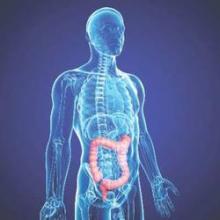Patients with stage III colon cancer who take aspirin or agents that inhibit cyclooxygenase-2 near the time of adjuvant chemotherapy have lower risks of recurrence and death, results of a prospective, observational study reported in the Journal of the National Cancer Institute suggest.
“Aspirin and COX-2 inhibitor use may be associated with improved outcomes in stage III colon cancer patients,” wrote the investigators, led by Dr. Kimmie Ng of Harvard Medical School, a medical oncologist at the Dana-Farber Cancer Institute, Boston.
“Results from the ongoing CALGB 80702 and ASCOLT trials are eagerly awaited,” they added, referring to randomized phase III trials testing celecoxib and aspirin, respectively, in similar patient populations. “Further exploration of predictive biomarkers of aspirin and COX-2 inhibitor activity is warranted.”
The investigators analyzed data from patients enrolled in the Cancer and Leukemia Group B (CALGB) 89803 trial, which compared different adjuvant chemotherapy regimens for stage III colon cancer. Medication use was assessed from self-report at various time points during treatment.
Overall, 9.4% of 799 patients with relevant data were aspirin users (reporting use both during and 6 months after chemotherapy) and 7.0% of 843 patients were users of COX-2 inhibitors (reporting use of celecoxib or rofecoxib 6 months after chemotherapy), according to the published results (J. Natl. Cancer Inst. 2015 [doi.org/doi:10.1093/jnci/dju345]).
With a median follow-up of 6.5 years, relative to nonusers of aspirin, users had trends toward better recurrence-free survival (multivariable hazard ratio, 0.51), disease-free survival (0.68), and overall survival (0.63). When events were censored at 5 years to minimize misclassification from noncancer death, aspirin users again had trends toward better disease-free survival (0.61) and overall survival (0.48).
Similarly, relative to nonusers of COX-2 inhibitors, users had trends toward better recurrence-free survival (multivariable hazard ratio, 0.53), disease-free survival (0.60), and overall survival (0.50). When events were censored at 5 years, COX-2 inhibitor users had significantly better disease-free survival (0.47) and overall survival (0.26).
Analyses suggested a possible dose-response relationship for aspirin, whereby benefit increased with weekly dose, but not for COX-2 inhibitors. Both protected similarly against recurrence across patient groups having differing clinical and disease characteristics.
Neither medication class was associated with an increased risk of cardiovascular events or most grade 3 and higher toxicities, with the exception that COX-2 inhibitor users were significantly more likely to develop leukopenia (adjusted odds ratio, 2.79).
“This analysis of [patients] enrolled in a chemotherapy clinical trial is an important addition to the literature, which supports a benefit for aspirin use after [colorectal cancer] diagnosis,” the investigators concluded. “The exact dose and duration of aspirin or COX-2 inhibitors required for a potential protective effect remains unclear, however.”
The findings are consistent with what is known about biological pathways affected by aspirin and COX-2 inhibitors, according to the investigators. Additionally, some evidence suggests that benefit may vary according to factors such as tumor molecular characteristics, although the study was not powered to assess such associations.
The study was supported in part by the Pharmacia and Upjohn Company, now Pfizer Oncology.



